Definition of non-celiac gluten sensitivity

Non-celiac gluten sensitivity (NCGS) manifests itself with non-specific symptoms that occur both intestinally and extra-intestinally and resemble the symptoms of celiac disease or wheat allergy. Diagnosis is made based on the response to a gluten-free diet, after celiac disease and wheat allergy have been ruled out.
There is a group of patients who react to the consumption of food containing gluten with symptoms such as abdominal pain, fatigue, headaches, rashes, or mental confusion ("foggy mind"). However, neither celiac disease nor wheat allergy is present in these instances. When these patients avoid gluten, their symptoms improve within a few weeks; when they are re-exposed to gluten the symptoms return. Whether the gluten or some other component of wheat is actually responsible for the reactions is currently the subject of debate in the scientific community. The focus is not just on gluten, it also includes amylase trypsin inhibitors (ATI) and FODMAPs. For this reason, some experts in this field may refer to NCGS more broadly as non-celiac wheat sensitivity.
Comparative differences with to celiac disease and wheat allergy
All three gluten-related disorders - NCGS, celiac disease and wheat allergy - have similar symptoms and therefore diagnosis can be difficult. However, there are differences, e.g. in terms of reaction times and pathogenesis. Celiac disease is an autoimmune enteropathy caused by gluten. Wheat allergy is an IgE-mediated response to wheat. Although people with NCGS develop symptoms similar to those observed in celiac disease after eating food containing gluten, the clinical presentation is generally less severe. However, in contrast to celiac disease, NCGS individuals usually do not present with auto-antibodies, anti-tissue-transglutaminases or autoimmune concomitant diseases. In contrast to celiac disease patients, patients with NCGS exhibit little histological change or only lesions in the small intestine mucosa, which corresponds to 0 - 1 on the Marsh scale.
Overview of how to distinguish between celiac disease, NCGS and wheat allergy
| Celiac disease | Gluten sensitivity | Wheat allergy | |
|---|---|---|---|
| Period between exposure to gluten and onset of symptoms | Weeks to years | Hours to days | Immediate reaction: a few hours Delayed reaction: a few hours to two days |
| Pathogenesis | Autoimmune (congenital + adaptive immunity) | Currently unclear immunological reaction | IgE formation and IgE-mediated mediator release |
| HLA | HLA DQ2/8 (approx. 95% of cases) |
Unclear | - |
| Autoantibodies | Positive (high sensitivity and specificity) |
Negative (except anti-gliadin antibodies IgA and/or IgG) |
Positive |
| Enteropathy | Typical | Missing; occasionally IEL slightly elevated (Marsh 0-1) | Missing |
| Symptoms | Intestinal and extra-intestinal | Intestinal and extra-intestinal | Intestinal and extra-intestinal |
| Complications | Concomitant diseases, long-term complications | No concomitant diseases, long-term complications unknown | No concomitant diseases |
| Therapy | Long-term implementation of a gluten-free diet is necessary Persons with celiac disease must avoid foods containing gluten, even those that contain only traces of gluten, for their entire life |
The gluten-free diet may be for a limited time The minimum time frame should be no less than one or two years The tolerance threshold of patients with NCGS varies, i.e. gluten intake must be adjusted individually |
Temporary avoidance of wheat-based foods is sometimes sufficient Administration of cortisone may be necessary |
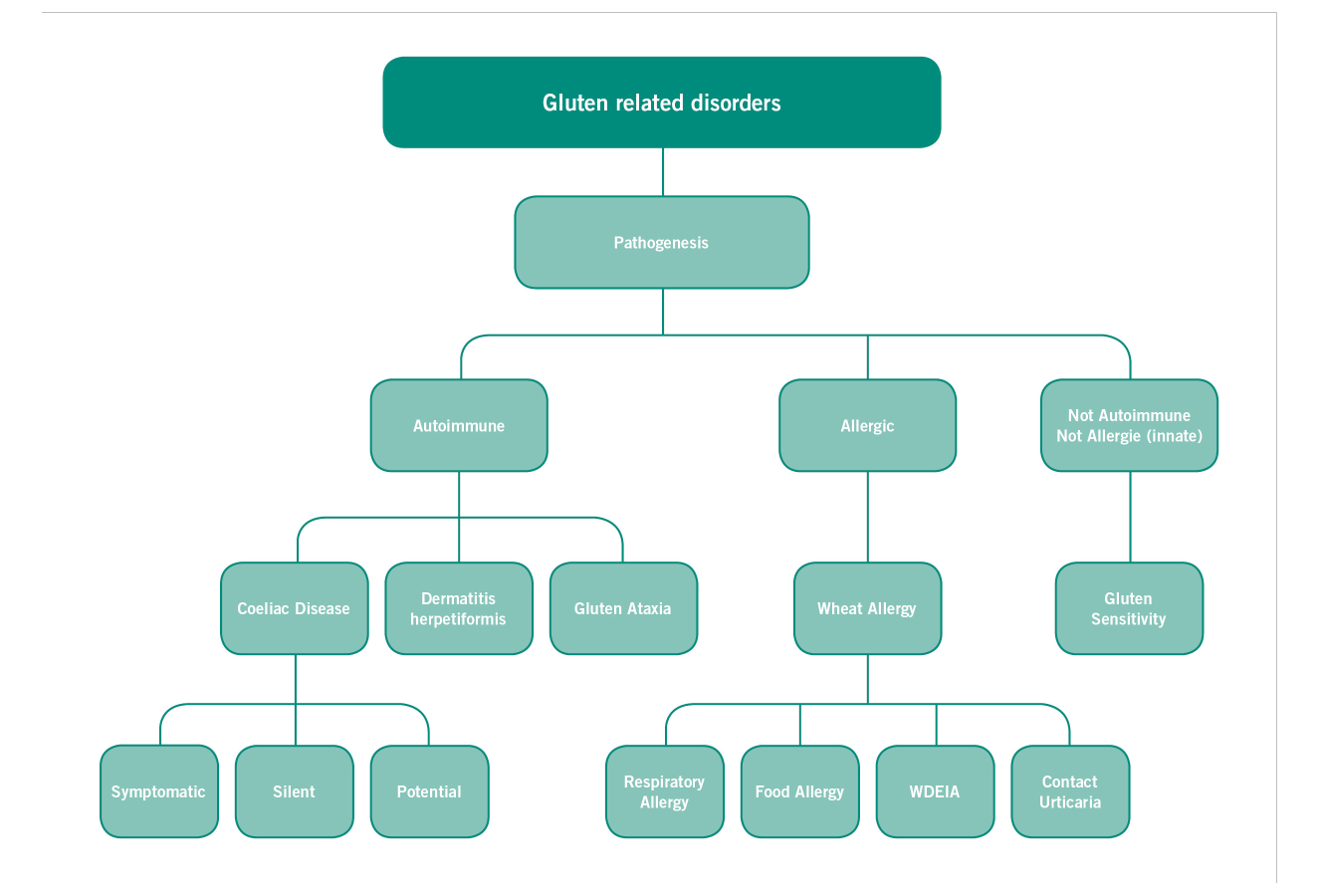
Overview of gluten-related diseases
Overview of gluten-related diseases from wheat allergy and celiac disease to gluten sensitivity
Overview of gluten-related diseases from wheat allergy and celiac disease to gluten sensitivity
Other chapters in the field of non-celiac gluten sensitivity:
Further information on this topic
Download
1
Show all
Presentations
2
Show all
Videos by Experts
5
Show all

Gluten Sensitivity Booklet
Based on the information from the consensus conference and further research Dr. Schär's Professional Team has developed a new booklet on gluten sensitivity. This booklet provides the most up to date information on the symptoms, diagnosis, and treatment of gluten sensitivity. The content summarizes the information from the expert consensus conference and further research from the leading researchers in this developing area of gluten related disorders.

Gluten Sensitivity Booklet
Based on the information from the consensus conference and further res...
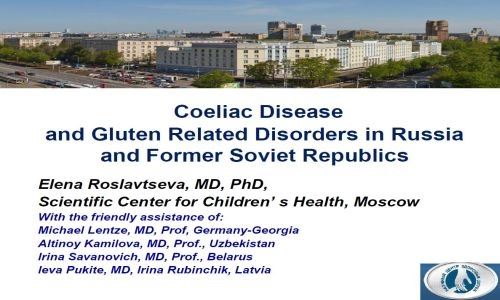
Coeliac Disease and Gluten Related Disorders in Russia and Former Soviet Republics (2015)
Elena Roslavtseva, MD, Ph.D.
Scientific Center for Children’s Health, Moscow
16th International Coeliac Disease Symposium 2015 in Prague
Pre-Conference Workshop on Gluten Sensitivity "The Evolving Planet of Gluten Related Disorders"
Scientific Center for Children’s Health, Moscow
16th International Coeliac Disease Symposium 2015 in Prague
Pre-Conference Workshop on Gluten Sensitivity "The Evolving Planet of Gluten Related Disorders"
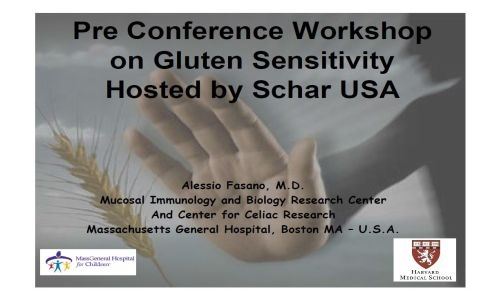
Pre Conference Workshop on Gluten Sensitivity (2013)
Alessio Fasano, M.D.
Medical Director
Mucosal Immunology and Biology Research Center and Center for Celiac Research
Massachusetts General Hospital
Boston MA, USA
15th International Celiac Disease Symposium on September 22 – 25, 2013, Chicago
Medical Director
Mucosal Immunology and Biology Research Center and Center for Celiac Research
Massachusetts General Hospital
Boston MA, USA
15th International Celiac Disease Symposium on September 22 – 25, 2013, Chicago

Coeliac Disease and Gluten Related Disorders in Russia and Former Soviet Republics (2015)
Elena Roslavtseva, MD, Ph.D.
Scientific Center for Children’s Health,...

Pre Conference Workshop on Gluten Sensitivity (2013)
Alessio Fasano, M.D.
Medical Director
Mucosal Immunology and Biology...
Non-Coeliac Gluten Sensitivity in Adult & Paediatric Patients
Professor Carlo Catassi
Gastroenterologist Pediatrician
Department of Pediatrics
Università Politecnica delle Marche
60123 Ancona, Italy
At the Expert Meeting 2014 in Salerno, Italy.
Gastroenterologist Pediatrician
Department of Pediatrics
Università Politecnica delle Marche
60123 Ancona, Italy
At the Expert Meeting 2014 in Salerno, Italy.
Gluten Sensitivity – Definition, Symptoms and Differences to Coeliac Disease
International Expert Meeting on Gluten Sensitivity 2012 in Munich, Germany
New Insights from the Second Expert Meeting on Gluten Sensitivity
International Expert Meeting on Gluten Sensitivity 2012 in Munich, Germany
Key Messages for Healthcare Professionals on Gluten Sensitivity
International Expert Meeting on Gluten Sensitivity 2012 in Munich, Germany
Management of Gluten Sensitivity: the Role of the Gluten-Free Diet
International Expert Meeting on Gluten Sensitivity 2012 in Munich, Germany
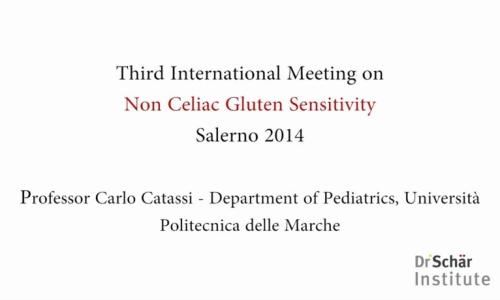
Non-Coeliac Gluten Sensitivity in Adult & Paediatric Patients
Professor Carlo Catassi
Gastroenterologist Pediatrician
Department o...
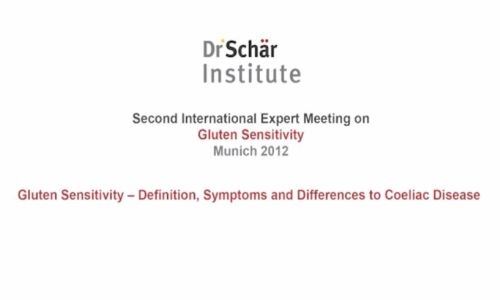
Gluten Sensitivity – Definition, Symptoms and Differences to Coeliac Disease
International Expert Meeting on Gluten Sensitivity 2012 in Munich, Ger...
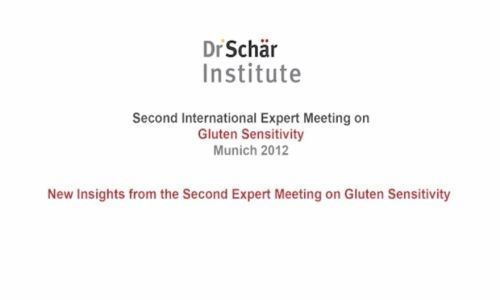
New Insights from the Second Expert Meeting on Gluten Sensitivity
International Expert Meeting on Gluten Sensitivity 2012 in Munich, Ger...

Key Messages for Healthcare Professionals on Gluten Sensitivity
International Expert Meeting on Gluten Sensitivity 2012 in Munich, Ger...

Management of Gluten Sensitivity: the Role of the Gluten-Free Diet
International Expert Meeting on Gluten Sensitivity 2012 in Munich, Ger...
www.drschaer-institute.com
